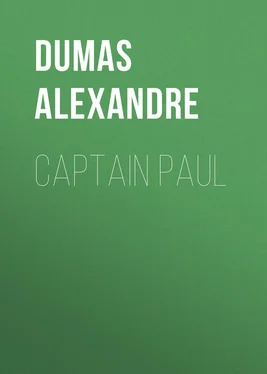Alexandre Dumas - Captain Paul
Здесь есть возможность читать онлайн «Alexandre Dumas - Captain Paul» — ознакомительный отрывок электронной книги совершенно бесплатно, а после прочтения отрывка купить полную версию. В некоторых случаях можно слушать аудио, скачать через торрент в формате fb2 и присутствует краткое содержание. Жанр: literature_19, foreign_antique, foreign_prose, на английском языке. Описание произведения, (предисловие) а так же отзывы посетителей доступны на портале библиотеки ЛибКат.
- Название:Captain Paul
- Автор:
- Жанр:
- Год:неизвестен
- ISBN:нет данных
- Рейтинг книги:3 / 5. Голосов: 1
-
Избранное:Добавить в избранное
- Отзывы:
-
Ваша оценка:
- 60
- 1
- 2
- 3
- 4
- 5
Captain Paul: краткое содержание, описание и аннотация
Предлагаем к чтению аннотацию, описание, краткое содержание или предисловие (зависит от того, что написал сам автор книги «Captain Paul»). Если вы не нашли необходимую информацию о книге — напишите в комментариях, мы постараемся отыскать её.
Captain Paul — читать онлайн ознакомительный отрывок
Ниже представлен текст книги, разбитый по страницам. Система сохранения места последней прочитанной страницы, позволяет с удобством читать онлайн бесплатно книгу «Captain Paul», без необходимости каждый раз заново искать на чём Вы остановились. Поставьте закладку, и сможете в любой момент перейти на страницу, на которой закончили чтение.
Интервал:
Закладка:
What the captain had foreseen then happened immediately on the display of this symbol of rebellion rising insolently in the air. The unknown ship immediately betrayed its incognita by hoisting the British flag. At the same moment a cloud of smoke was seen issuing from the side of the royalist ship, and before the report was heard, a cannon ball was seen tipping from wave to wave, and fell about a hundred yards short of the Indienne.
"Beat to quarters, Mr. Walter, for you see we have guessed rightly. Come, my boys," cried he, to the crew, "hurrah for America! and death to England!"
This was answered by a general shout, and had not ceased, when they heard them beating to quarters on board the Drake , for that was the name of the English ship. The drums of the Indienne immediately replied, and every man ran to his post: – the gunners to their guns, the officers to their stations, and the sailors to their running rigging. As to the captain, he jumped upon the top of the companion, his speaking trumpet in his hand – the supreme symbol, the sceptre of nautical royalty, which the commander always wields in the hour of combat or during the raging of the tempest.
They now seem to have made an exchange of parts, for the English appeared impatient, and the Americans affected calmness. The ships were hardly within gun shot, when a long line of smoke was seen issuing from the side of the English vessel, and a report similar to loud thunder was heard, and the iron messengers sent to deal death among the rebels, having in their impetuosity, miscalculated the distance, fell harmless before reaching the sides of the frigate. The latter, however, as if refusing to reply to so premature an attack, continued to haul to the wind, as if to spare the enemy too long a course.
At this moment the captain turned, as if to give a last look round his ship, and his astonished gaze was attracted by the appearance of a new personage on the deck, who had selected this dangerous and exciting moment to make his entrance upon the scene.
It was a young man, somewhere about twenty-two or twenty-three years of age. His face was pale and mild; he was plainly, but elegantly dressed, and whom the captain had not before seen on board. He was leaning against the mizen-mast, his arms folded over his chest, and looking with melancholy indifference at the English vessel which was approaching them under a heavy press of canvas. The calmness at such a moment, and in a man who appeared a stranger to nautical combats, forcibly struck the captain. He then remembered the prisoner, whom the Count d'Auray had announced to him, and who had been brought on board during the last night he had passed at the anchorage of Port Louis.
"Who allowed you to come on deck, sir?" said he, softening as much as possible, the tone of his enquiry, so that it would have been difficult to ascertain whether this was addressed as a mere question, or as a reproach.
"No one, sir," replied the prisoner, in a soft and sorrowful voice; "but I had hoped that under the present circumstances, you would less severely observe the orders by which I became your prisoner."
"Have you forgotten that you were forbidden to hold any communication with the ship's company."
"I did not come here for the purpose of holding communication with the ship's company, sir; I came to see whether some friendly cannon ball would do me a good' turn."
"You may, but too soon, have your desire accomplished, if you remain where you are now standing; therefore, believe me, you had better remain below."
"Is this your advice; or an order, captain?"
"You have full liberty to construe it as you please."
"In that case," replied the young man, "I thank you – I will remain here."
At this instant, another loud report was heard; but the two ships had by this time neared each other so much, that they were within gun-shot, and the whole tempest of shot passed through the sails of the Indienne. Two splinters fell from the masts; and the groans and stifled cries of some of the ship's company were heard. The captain, at that moment, had his eyes fixed upon the prisoner, above whose head, a cannon ball had passed within two feet, grazing the mizen mast, against which he was leaning; but notwithstanding this death warning, he remained calm and unmoved, in the same attitude as if he had not felt the wing of the exterminating angel waft above his head. The captain knew how to appreciate courage – this incident was sufficient to assure him of the undaunted bravery of the man who stood before him.
"Tis well, sir," said he to him; "remain where you are, and when we come to boarding, if you should be tired of remaining with your arms crossed, take up a cutlass, or an axe, and give us a helping hand. You will excuse me not payings you more attention at this moment, for I have other things to do."
"Fire!" cried he, in a voice of thunder, through his speaking trumpet, "now, give it her: fire!"
"Fire!" repeated the officers like an echo, at their different stations.
At the instant, the Indienne trembled from her keel, to her royal mast head, as she poured her broadside into the enemy – a cloud of smoke spread itself like a veil, along the starboard-side, which was soon carried to leeward. The captain, standing upon the companion, impatiently awaited its clearing off, that he might ascertain the effect which the broadside had produced upon the enemy's vessel. When his gaze could penetrate through the smoke, he perceived that the enemy's main top mast had fallen, and had, with its sails, encumbered the after-part of the Drake's deck, and that her other sails were cut to ribbons. Then putting his speaking trumpet to his mouth, he cried —
"Well done! my lads. Now watch her closely. They will be too busy in clearing away the wreck of their mast, to think of raking us – fire – as you can – and this time shave close!"
The crew hastened to obey this order – the frigate veered round, and as the guns were brought to bear upon the enemy, they were discharged with terrible effect; and, as the captain had imagined, without any hindrance from the Drake. The Indienne once more trembled like a volcano, and, as a volcano, vomited forth her flame and smoke.
This time the gunners had followed the orders of their captain to the letter, (and the broadside had been fired point blank) striking the hull and the lower masts. Both her masts were still standing; but on all sides the sails were hanging in tatters. It appeared that some more considerable damage had been done, which it was impossible to ascertain at that distance; for some time, the broadside was not returned; at length it was, and instead of raking the Indienne , it struck her in a diagonal direction. It was not the less terrible, for it swept off many a brave fellow from the deck; but by a chance which appeared positively magical, touched neither of the masts. Some of the running rigging was cut, but nothing that prevented her manoeuvring as before. At one glance, Paul ascertained that he had only lost some men. His heart bounded with joy. He once more placed the speaking-trumpet to his mouth.
"Larboard the helm," cried he, "and board her on the larboard side! Boarders, to your stations – be ready! Give her one more broadside."
At the first movement of the Indienne , the enemy at once perceived the intention, and endeavoured to neutralize it by it similar movement, but at the instant of attempting to execute it, a dreadful crash was heard on board her, and the mainmast, which had been nearly cut through by the last discharge from the Indienne , trembled, for a few seconds like an uprooted tree, and fell forward, covering the deck with the mainsail and the rigging. Captain Paul at once comprehended what had delayed the return of the broadside.
"Now, she is ours, my lads!" cried he; "we have only to take her. One last broadside within pistol shot, and then we'll board her!"
Читать дальшеИнтервал:
Закладка:
Похожие книги на «Captain Paul»
Представляем Вашему вниманию похожие книги на «Captain Paul» списком для выбора. Мы отобрали схожую по названию и смыслу литературу в надежде предоставить читателям больше вариантов отыскать новые, интересные, ещё непрочитанные произведения.
Обсуждение, отзывы о книге «Captain Paul» и просто собственные мнения читателей. Оставьте ваши комментарии, напишите, что Вы думаете о произведении, его смысле или главных героях. Укажите что конкретно понравилось, а что нет, и почему Вы так считаете.












